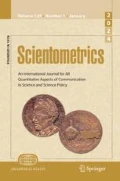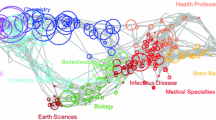Abstract
We propose an improved Data Envelopment Analysis (DEA) model to evaluate the efficiency of research groups in the area of information science in PR China. By taking the research groups as Decision Making Units (DMUs), the budget of the projects and size of the groups as inputs and the quantity and quality of publications produced by the groups as outputs of the model, the relative efficiencies of 21 research projects are evaluated. Then, we move to focus on the issues of knowledge management of the organizations that undertook these projects and attempt to explore the underlying reasons of high research efficiency. Through integrating the evaluation outcomes into research process, three indicators of knowledge management are identified for the best practice groups with highest research efficiency. The findings verify that the proposed model is valid and practical to assess research performances on the basis of bibliometric indicators.
Similar content being viewed by others
References
Adam, D. (2002), Citation analysis: The counting house, Nature, 415: 726-729.
Annual Report of Science and Technology Development of China (By Research Group on Development and Strategy of S&T of China, 2002), Beijing: Economic Management Publishing House (in Chinese), 148-152.
Anderson, P., Peterson, N. C. (1993), A procedure for ranking efficient units in data envelopment analysis, Management Science, 39: 1261-1264.
Bordons, M., FernÁndez, M. T., GÓmez, I. (2002), Advantages and limitations in the use of impact factor measures for the assessment of research performance in a peripheral country, Scientometrics, 53(2): 195-206.
Brown G. E. (1992), Report of Task Force on the Health of Research, Chairman's report to the Committee on Science, Space and Technology, US House of Representatives, No.56–819 (US Government Printing Office, Washington).
Charnes, A., Copper, W. W., Rhodes, E. (1978), Measuring the efficiency of decision making units, European Journal of Operational Research, 2: 429-444.
Charnes, A., Copper, W. W., Lewin, A. Y., Seiford, L. M. (1994), Data Envelopment Analysis: Theory, Methodology and Applications, Dordrecht: Kluwer Academic Publishers.
Citation Analysis Guidelines, http://sunweb.isinet.com/editions/vol1issue1/citation.html.
Damm, D., Schindler, M. (2002), Security issues of a knowledge medium for distributed project work, International Journal of Project Management, 20: 37-47.
Davenport, T. H., Prusak, L. (1998), Working Knowledge: How Organizations Manage What They Know. Boston, MA: Harvard Business School Press.
Davenport, T., De Long, D. W., Beers, M. C. (1998), Successful knowledge management projects, Sloan Management Review, 18(4): 43-57.
Day, G., Glazer, R. (1994), Harnessing the marketing information revolution: Toward the market-driven learning organization. In: R. C. Blattberg, R. Glazer, J. D. C. Little (Eds), The Marketing Information Revolution, Boston, MA: Harvard Business School Press, pp. 270-288.
Garvin, D A. (1993), Building a learning organization. Harvard Business Review, 71(4): 78-91.
Goto, M., Tsutsui, M. (1998), Comparison of productive and cost efficiencies among Japanese and US electrical utilities. Omega, International Journal of Management Science, 26: 177-194.
Healey, B. P., Irvine, J., Martin, B. (1988), Quantitative science-policy studies in the United Kingdom, Scientometrics, 14: 177-183.
Kostoff, R. N. (2002), Citation analysis of research performer quality, Scientometrics, 53(1): 49-71.
Lee, J. H., Kim, Y. G. (2001), A stage model of organizational knowledge management: a latent content analysis, Expert Systems with Applications, 20: 299-311.
Liebowitz, J., Wilcox, L. C. (1997), Knowledge Management and its Integrative Elements, Boston: CRC Press.
Lu, Q., Lazonick, W. (2001), The organisation of innovation in a transitional economy: business and government in Chinese electronic publishing, Research Policy, 30: 55-77.
Marx, W., Schier, H., Wanitschek, M. (2001), Citation analysis using online databases: Feasibilities and shortcomings, Scientometrics, 52(1): 59-82.
Mclnerney, C. (2002), Knowledge management and the dynamic nature of knowledge, Journal of the American society for Information Science and Technology, 53(12): 1009-1018.
Moed, H. F., Burger, W. J. M., Franfort, J. G., Van Raan, A. F. J. (1985), The use of bibliometric data for the measurement of university research performance, Research Policy, 14: 131-149.
Moed, H. F. (2002), Measuring China's research performance using the Science Citation Index, Scientometrics, 53(3): 281-296.
Narin, F., Frame, J. D. (1989), The growth of japanese science and technology, Science, 245: 600-605.
Nonaka, I. (1994), A dynamic theory of organizational knowledge creation. Organizational Science, 5(1): 14-37.
Phelan, T. J. (1999), A compendium of issues for citation analysis, Scientometrics, 45(1): 117-136.
Pichappan, P., Sarasvady, S. (2002), The other side of the coin: The intricacies of author self-citations Scientometrics, 54(2): 285-290.
Romer, O. M. (1999), Beyond the knowledge worker. In: M. H. Zack (Ed.), Knowing and Strategy, Boston: Butterworth Heinemann, pp. 69-76.
Ruggles, R. (1998), The state of the notion: knowledge management in practice, California Management Review, 40(3): 80-89.
Sbarcea K. (2001), The mystery of knowledge management, New Zealand Management, 48(10): 33-39.
Seiford, L. M. (1996), Data envelopment analysis: the evolution of the state of the art (1978–1995), Journal of Product Annals, 7: 99-137.
Sheng, Z. H., Zhu, Q., Wu, G. M. (1996), Data Envelopment Analysis: Theory, Methodology and Application, Beijing: Science Press, pp. 299-301 (In Chinese).
Southon, F. C. G., Todd, R. J., Seneque, M. (2002), Knowledge management in three organizations: an exploratory study, Journal of the American society for Information Science and Technology, 53(12): 1047-1059.
Stewart, T. A. (2001), The Wealth of Knowledge: Intellectual Capital and the Twenty-First Century Organization. New York: Currency.
Sueyoshi, T. (1999), DEA non-parametric ranking test and index measurement: slack-adjusted DEA and an application to Japanese agriculture cooperatives, Omega, International Journal of Management Science, 27: 315-326.
Turner, J. R. (1999), The Handbook of Project-based Management (2nd ed). McGraw-Hill, London.
Turner, J. R., Keegan, A. (2001), Mechanisms of governance in the project-based organization: Roles of the broker and steward, European Management Journal, 19(3): 254-267.
Turner, J. R., Mueller, R. (2003), On the nature of the project as a temporary organization, International Journal of Project Management, 21: 1-8.
Warner, J. (2000), Research assessment and citation analysis, The Scientist, 14(21): 39, Oct. 30.
Author information
Authors and Affiliations
Rights and permissions
About this article
Cite this article
Jiancheng, G., Junxia, W. Evaluation and interpretation of knowledge production efficiency. Scientometrics 59, 131–155 (2004). https://doi.org/10.1023/B:SCIE.0000013303.25298.ae
Issue Date:
DOI: https://doi.org/10.1023/B:SCIE.0000013303.25298.ae




